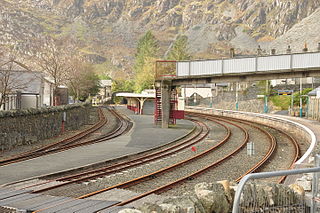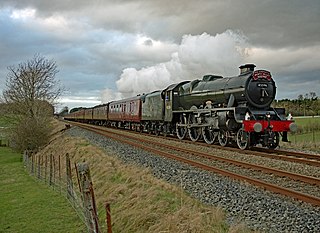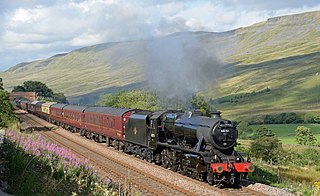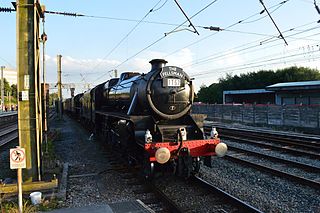
70013 Oliver Cromwell is a British Railways Standard Class 7 preserved steam locomotive. The locomotive is notable as one of the four steam locomotives which worked the last steam railtour on British Railways (BR) in 1968.

West Coast Railways (WCR) is a railway spot-hire company and charter train operator based at Carnforth MPD in Lancashire. Using buildings and other facilities previously owned by the Steamtown Carnforth visitor attraction, in June 1998 the company became the first privately owned company to be given a licence as a train operating company.

Tyseley Locomotive Works, formerly the Birmingham Railway Museum, is the engineering arm of steam railtour promoter Vintage Trains based in Birmingham, England. It occupies part of the former Great Western Railway's Tyseley depot, built in 1908 to accommodate expanding operations in the West Midlands, particularly the opening of the North Warwickshire Line as a new main line from Birmingham to Bristol.

The BR Standard Class 4 2-6-0 is a class of steam locomotive designed by Robert Riddles for British Railways (BR). 115 locomotives were built to this standard.

The Conwy Valley line is a railway line in north-west Wales. It runs from Llandudno via Llandudno Junction to Blaenau Ffestiniog, and was originally part of the London and North Western Railway, being opened in stages to 1879. The primary purpose of the line was to carry slate from the Ffestiniog quarries to a specially built quay at Deganwy for export by sea. The line also provided goods facilities for the market town of Llanrwst, and via the extensive facilities at Betws-y-Coed on the London to Holyhead A5 turnpike road it served many isolated communities in Snowdonia and also the developing tourist industry. Although only a little over 27 miles (43 km) between Llandudno and Blaenau Ffestiniog, the journey takes over one hour, largely due to the sinuous and steeply graded nature of the route taken. Most of the stations along the line are treated as request stops.

LMS Royal Scot Class 6115 Scots Guardsman is a preserved British steam locomotive. Built by the London, Midland and Scottish Railway (LMS) as a member of the Royal Scot Class, it was later operated by British Railways.

London, Midland and Scottish Railway (LMS) Jubilee Class No. 5690Leander is a preserved British steam locomotive.

London, Midland and Scottish Railway (LMS) Jubilee Class 5596Bahamas is a preserved British steam locomotive. It is named after The Bahamas.

London, Midland and Scottish Railway (LMS) Stanier Class 5 4-6-0 No. 5305 is a preserved British steam locomotive. In preservation, it has carried the name Alderman A.E. Draper, though it never carried this in service. It was named after Albert Draper, the man who rescued the locomotive in his own scrapyard.

Stanier Class 5 4-6-0 5231 is a preserved British steam locomotive. In preservation, it has carried the names 3rd (Volunteer) Battalion The Worcestershire and Sherwood Foresters Regiment and The Sherwood Forester, though it never carried either of these in service.

An excursion train is a chartered train run for a special event or purpose. Examples are trains to major sporting event, trains run for railfans or tourists, and special trains operated by the railway company for employees and prominent customers.
The Scottish Region (ScR) was one of the six regions created on British Railways (BR) and consisted of ex-London, Midland and Scottish Railway (LMS) and ex-London and North Eastern Railway (LNER) lines in Scotland. It existed from the creation of BR in 1948, and was renamed to ScotRail in the mid-1980s.
A railtour is a special train which is run in order to allow people to experience rail travel which is not normally available using timetabled passenger services. The 'unusual' aspect may be the route of the train, the destination, the occasion, specific sections of railway track, the locomotive hauling the train, the rolling stock, or any combination of these. Organisers may own or hire locomotives or rolling stock, or tours may be organised by railway management or other bodies outside the railway fraternity. Perhaps the most famous railtour in England was the Fifteen Guinea Special, the last steam hauled main line train run by British Rail. Railtours are often identifiable through the use of a train headboard, often identifying the name of the specific tour or the tour operator. On TOPS, railtours are usually given a 1Zxx headcode. Exceptions to this rule include regularly scheduled railtours such as the Belmond British Pullman operated Venice-Simplon Orient Express trains.

The Stobart Pullman was a railtour operator in the United Kingdom, operating pullman type charter trains, as Stobart Rail Tours. The company was a subsidiary of Eddie Stobart Ltd. and was operated by Stobart's rail partner, Direct Rail Services (DRS). On 16 July 2008, the company released a statement on its website that "train operations have been suspended".

The Fifteen Guinea Special was the last main-line passenger train to be hauled by steam locomotive power on British Rail on 11 August 1968 before the introduction of a steam ban that started the following day, the extra day added to allow for the movement of locomotive BR Standard Class 7 70013 Oliver Cromwell to Bressingham Steam Museum. It was a special rail tour excursion train organised for the occasion from Liverpool Lime Street via Manchester Victoria to Carlisle and back, and was pulled in turn by four steam locomotives during the four legs of the journey. The last scheduled standard gauge steam-hauled passenger services had run on 3 August 1968 from Preston. Steam continued to be used on the narrow gauge Vale of Rheidol Railway under British Rail, which was subsequently privatised in 1989.
The Scarborough Spa Express (SSE) is a regular summer heritage steam locomotive service between York and Scarborough. It is currently operated by the West Coast Railways, but has been operated in previous years by different companies, including the Railway Touring Company.
Carnforth MPD (Motive Power Depot) is a former London Midland and Scottish Railway railway depot located in the town of Carnforth, Lancashire, England.

LMS Stanier Class 8F 8151 is a preserved British steam locomotive.

LMS Stanier Class 5MT 4932, is a preserved British steam locomotive. It is one of 18 surviving members of the Black 5 class which had 842 members constructed by five manufacturers. 44932 is the sole remaining member of the class which was built at the LMS's Horwich Works.

Locomotive Services Limited is a train operating company in Great Britain. The company operates rail tours using heritage steam, diesel and electric locomotives with support from associated companies and trusts.














